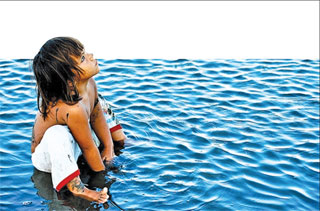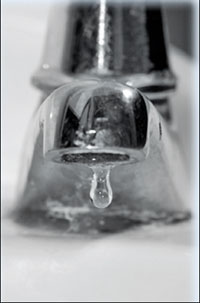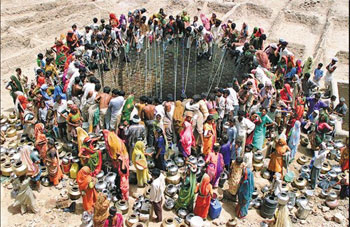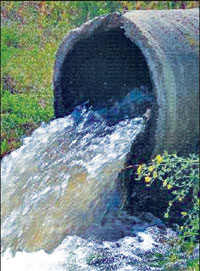|
Water….:
Save every drop!
Planet Earth is called the Blue Planet because two thirds of the
planet is covered with water - the wonder liquid of life . Yet,today the
world is facing a water crisis which will only
 worsen with time as the
freshwater resources around the world dwindle drop by drop. With more
than a billion people around the world lacking access to safe drinking
water and over two million children dying every year due to the lack of
safe drinking water and diseases associated with it, it is imperative
that we save every drop of the freshwater available in the world. worsen with time as the
freshwater resources around the world dwindle drop by drop. With more
than a billion people around the world lacking access to safe drinking
water and over two million children dying every year due to the lack of
safe drinking water and diseases associated with it, it is imperative
that we save every drop of the freshwater available in the world.
Last week we enlightened you about freshwater, its availability and
distribution and the water footprint or the use of virtual water in the
products we use daily. Today we bring more interesting facts about this
wonder liquid that keeps the world alive so that you can make conserving
freshwater a priority in your life.
Most of you are aware by now about the need to use water sparingly
and conserve this precious resource because freshwater is becoming
scarce in the world. Your awareness of the vital role water plays in our
lives is evident from some of your articles published in the page today.
However, it is easy to lose your focus on the urgency of conserving
water ,especially when it comes to virtual water since it is not visible
as to how much is actually used ....
It is perhaps in this context that this year’s World Water Day theme
is ‘Water and Food Security’ which aims to raise an awareness on the
amount of water needed to produce food. Each product “consumes” water to
grow and by providing you all information about these consumptions,
every meal will make us aware of how much water is used for our food,
and which products may require a lower water input. So, in the future
there is a strong possibility that most goods and services around the
world will specify the water input in them .
The UN General Assembly adopted a resolution on December 22, 1992,
declaring March 22 to be the World Day for Water each year. Countries
were encouraged to develop activities to highlight local needs for
water. The first World Day for Water was observed in 1993.
The Water for Life Decade was launched on World Water Day in 2005.
This decade will run from 2005 to 2015 and give a high profile to
women’s participation and the UN’s water-related programmes.
In many countries, the primary reason people cannot rise above the
poverty line is the water scarcity. Women and children bear the burdens
disproportionately. Most often they are forced to walk for miles in the
scorching sun in search of water to meet the requirements of their
families and communities. It is a growing problem. However, there is
hope. Proven solutions to the water problem such as digging wells and
rainwater harvesting currently exist. Proper funding and a collective
will can make universal safe drinking water a reality.
There is a lot you can do to conserve water. So, make a commitment to
save every drop and not let it go to waste.
Don’t waste water

Water is very important to us. Without water we cannot live.
Everybody needs water, to wash, cook, bathe and do many other
things.Animals and plants too need water.We get water from rain, rivers,
lakes and reservoirs.
In the world there is 70 per cent water, but the water in oceans and
seas are salty. So, we cannot use the water in them.
Some countries do not have enough water. Ethiopia, Somalia and Sudan
are some examples.
Our ancient kings did not waste a single drop of water. They built
huge tanks to collect water so that it could be used in the dry seasons.
Do not waste water. It is our duty to conserve it.
Bhagya Gajadheera,
Grammar School,
Battaramulla.
Water - our life blood!
Water is a valuable gift of nature. All living beings and plants need
water for their survival.We require water for different purposes. We can
live for a few days without food, but we can’t live without water. We
need water for our daily activities like bathing, cooking, washing and
cleaning.
Water plays a major role in the life of all living beings, especially
humans.In village areas of some countries, it is difficult to transport
goodby road. They have to transport things via rivers. Rivers are very
useful as we can use water in them to generate power.
About 70 per cent of the Earth is covered by water.
Even though there is a great mass of water, only a small part of it
is clean to be used for drinking, cooking and other purposes.We need
water for cultivation. If there is a drought we cannot cultivate and
people suffer without food and an income. So, each and every drop of
water should be saved.Most people do not use water sparingly. They waste
this valuable resource. We can see how some people keep taps open while
engaged in other activities. Every drop wasted leads to scarcity.
The Government must impose strict laws to protect all water
resources. People who pollute waterways should be punished severely.
Public awareness programmes too should be organised throughout the
country to teach the people the value of water.
Nethma Devanji Jayathilaka,
Grade 7 - Nelum, St. Joseph’s Balika MV,
Kegalle.
An amazing resource
 Water is essential in the lives of every living being. Water is a
natural resource with the formulae H2O. It is a tasteless, odourless
liquid. It is virtually colourless. Water is essential in the lives of every living being. Water is a
natural resource with the formulae H2O. It is a tasteless, odourless
liquid. It is virtually colourless.
Water is a fundamental part of life. It is used in agricultural,
industrial, household, recreational and environmental activities. Not
only man depends on water but also his surroundings such as plants and
animals depend on water.Human beings can live without eating even for
three days. But they cannot live without drinking water even for three
days. Water usually makes up 70 per cent of the human body.
About 85 per cent of our brain tissue is made of water.Water saves
time and energy. It is easy to keep everything neat and clean by using
water.Drinking water is the most important piece in the weight loss
puzzle. Water helps us maintain our body temperature and also aids bowel
movement.
Seas, oceans, rivers, wells, springs, reservoirs and lakes are
sources of water.
Water is a precious resource. Nothing in this world can equal it. So,
we should stop wasting water and conserve it.
Nusrath Jawsy,
Ilma International School.
Keep water sources clean

Water is very important for humans, animals and plants. Chemicals and
other harmful substances not only pollute our freshwater resources, but
also streams, lakes, rivers and seas. Pollution affects a large number
of fish and other animals. People who use polluted water too can fall
ill and even die.
Humans pollute water in many ways. Insecticides, weedicides and
fertilizer used in large quantities in farming are a major source of
pollution. When it rains, these chemicals flow into streams, lakes and
rivers. Harmful chemicals, gases and waste materials are also sometimes
released from industrial factories into waterways.
We should control pollution and help keep our water resources clean.
Farmers should not use excessive chemicals and also release such
toxic chemicals into waterways. Another way of preventing water
pollution is to build cleaning treatment plants in factories. If we stop
throwing waste into lakes, rivers and seas, they will stay clean and
beautiful forever.
Water is needed for our existence and we should ensure there is
clean, fresh water for everyone in the world.
Vidhursheni Vigneswarn,
Grade 6A,
Hindu Ladies’ College.
What you should know...
* Water-related illnesses are the leading cause of human sickness and
death.
*1.1 billion people in the world do not have access to safe drinking
water, roughly one-sixth of the world’s population.
*2.2 million people in developing countries, most of them children,
die every year from diseases associated with lack of access to safe
drinking water, inadequate sanitation and poor hygiene.
* Some 6,000 children die every day from disease associated with lack
of access to safe drinking water, inadequate sanitation and poor hygiene
- equivalent to 20 jumbo jets crashing every day.
*The average distance that women in Africa and Asia walk to collect
water is six kilometres.
*Tens of millions of children cannot go to school as they must fetch
water every day.
*About 80 per cent of diseases in the developing world are caused by
contaminated water
*The water and sanitation crisis claims more lives through disease
than any war claims through guns.
*The average person in the developing world uses 2.64 gallons of
water a day.
*In the United Kingdom an avarage person uses 35.66 gallons of water
per day and in the United States, between 100 and 175 gallons every day
at home.
*Water is a 400 billion dollar global industry; the third largest
behind electricity and oil.
* The UN estimates it would cost an additional 30 billion dollar to
provide access to safe water to the entire planet. That’s a third of
what the world spends in a year on bottled water.
* It takes five litres of water to make one litre of bottled water.
* Almost 70 per cent of the available fresh water gets used for
irrigation in agriculture.
*20 percent of freshwater fish species have been pushed to the edge
of extinction from contaminated water.
*Half of the world’s 500 major rivers are seriously depleted or
polluted.
* The water we drink today is the same water the dinosaurs
drank—there is no new water.
* The Millennium Development Goals (MDGs) call for halving “by 2015,
the proportion of people without sustainable access to safe drinking
water and basic sanitation.” The MDG for safe drinking water on a global
scale appears likely to be reached, in most regions, with the exception
of sub-Saharan Africa.
* Only one per cent of the total water resources on Earth is
available for human use. While 70 per cent of the world’s surface is
covered by water, 97.5 per cent of that is salt water. Of the remaining
2.5 per cent that is freshwater, almost 68.7 per cent is frozen in ice
caps and glaciers.
*Freshwater ecosystems have been severely degraded: it is estimated
that about half the world’s wetlands have been lost, and more than 20
per cent of the world’s 10,000 known freshwater species have become
extinct, threatened or endangered .
* By 2025, it is estimated that about two thirds of the world’s
population - about 5.5 billion people - will live in areas facing
moderate to severe water stress.
*People in slum areas have very limited access to safe water for
household uses. A slum dweller may only have 5 to 10 litres per day at
his or her disposal, while a middle- or high-income person in the same
city may use some 50 to 150 litres per day, if not more .
Facts and pix : Internet |

